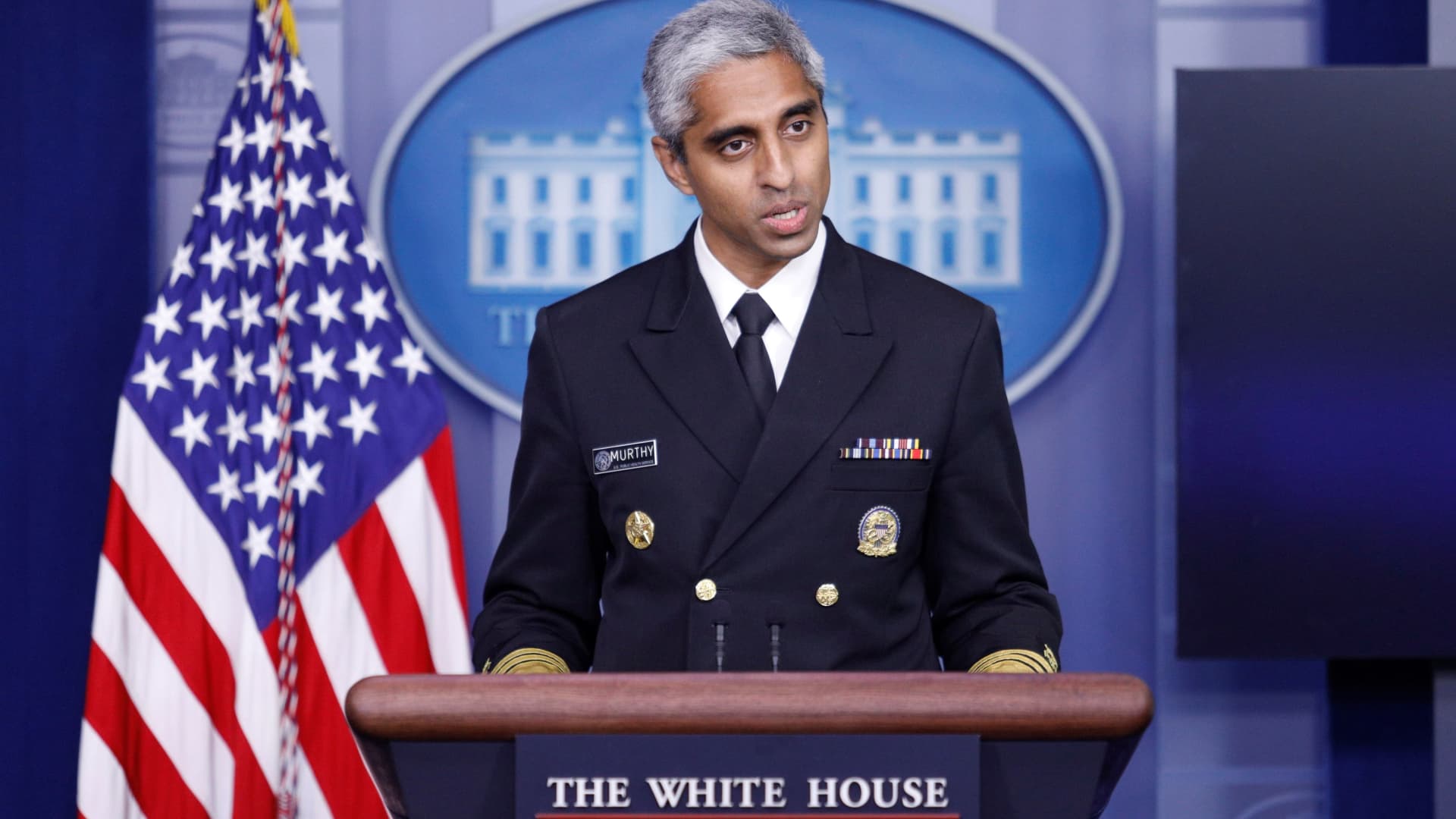U.S. Surgeon General Vivek Murthy speaks during a news conference with White House Press Secretary Jen Psaki at the White House in Washington, July 15, 2021.
Tom Brenner | Reuters
US Surgeon General Vivek Murthy warns in a new report consult Widespread use of social media by children and young people poses serious mental health risks that need to be addressed immediately, Tuesday.
According to a report released by the Surgeon General’s Office, such recommendations “are reserved for major public health challenges that require immediate national awareness and action.” The report is based on a “substantial review of the available evidence” on the impact of social media.
This isn’t the first time Murthy has pointed out that social media contributes to a public health threat. In 2021, he published an advisory on the threat of Covid misinformation and called on social media companies to make changes in favor of fact-based sources.He also said that age 13 “Too Early” Use social media.
In his latest consultation, Murthy acknowledged that social media can have both positive and negative effects on children. Social media use is near-universal among young people, with as many as 95 per cent of people aged 13 to 17 reporting using it, the report said. The report says children and adolescents’ use of social media can lead to “heightened emotional sensitivity,” which can lead to lower life satisfaction, as well as positive spaces for community, information and self-expression. For children from marginalized backgrounds, a sense of community that young social media users may experience online may be more important, the report said.
“Most teens report that social media helps them feel more accepted (58%), like they have someone who can support them during difficult times (67%), like they have a place to showcase their creativity( 71%), and are more connected to what’s going on in their friends’ lives (80%),” the report said.
Still, social media use can be harmful, causing or exacerbating eating disorders, low self-esteem and depression, according to research cited by the Surgeon General’s Office.
“Currently, we do not have enough evidence to determine whether social media is sufficiently safe for children and young people,” the report said. “We must acknowledge the growing body of research on the potential harms, increase our collective understanding of the risks associated with social media use, and act urgently to create a safe and healthy digital environment that minimizes harm and protects children and Adolescent mental health and wellbeing – at a critical stage in development.”
Some of the areas where the Surgeon General’s Office has called for more research include distinguishing the health effects of in-person versus digital social interactions, which content causes the most harm to young users, and what factors can protect children from the harmful effects of social media use. .
Although more research is needed, the surgeon warns that action cannot wait.
“Our children and adolescents do not have the luxury of waiting years before we understand the full scope of social media’s impact. Their childhood and development is happening,” the report said. “As we live through a national youth mental health crisis, now is the time to act quickly and decisively to protect children and young people from the risks of harm.”
The warning fits with calls from parents, Congress and the president to pass laws to better protect children online. Still, figuring out how to do this without inadvertently causing new harm to self-expression or privacy can be challenging.
The surgeon general has several recommendations for policymakers, technology companies, parents and caregivers, young social media users and researchers. They include:
For policy makers:
- Develop “age-appropriate health and safety standards”.
- There needs to be more data privacy protections for children.
- Funding for future research.
- Support digital and media literacy education in schools.
- Require tech companies to share health-related data.
For technology companies:
- Conduct an independent assessment of the impact of their products on children.
- Share findings and underlying data with researchers.
- There are timely systems in place to handle complaints and requests from young users, their families and educators.
- Make health and safety a top priority when designing products.
For parents and carers:
- Set expectations about how technology will be used.
- Create “tech-free zones,” such as during dinner or before bed.
- Create shared practices around social media with other parents.
For children and teens:
- If they or a friend has been hurt by social media, seek help, such as finding expert information at the National Center of Excellence for Social Media and Youth Mental Health, or if they or a friend are in crisis, call or text the suicide hotline 988.
- Be careful not to share too much information on social media
- Report online harassment or abuse.
For researchers:
- Identify best practices for healthy use of social media.
- Create standardized definitions and metrics to discuss social media and mental health outcomes.
- To determine the role of developmental stage on the progression of adverse mental health outcomes from social media use.


